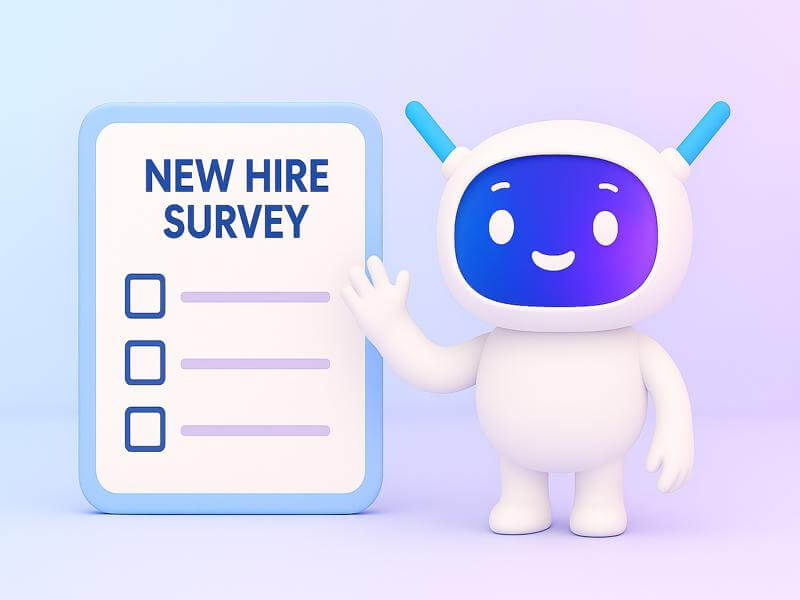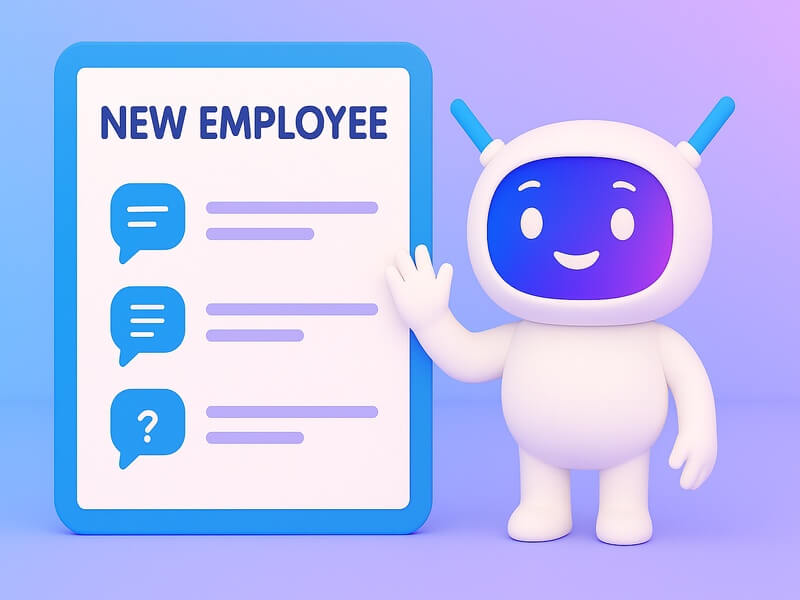
What is an employee experience survey?
Employee experience surveys measure employee satisfaction and motivation. These surveys synthesize employee feedback into actionable, integrated insights that improve the employee experience by providing companies with information to understand their most critical stakeholders: employees. These tools can be used as a part of an employee engagement framework for managers/executives to communicate employee needs and expectations to the company.
Employee experience surveys may be part of a one-time HR initiative or a regular annual survey (some companies may even schedule them monthly or bi-monthly!). They may be short or long, although best practices suggest a maximum burden of 15 minutes to complete. Some companies will run a regular short pulse survey on employee engagement, and longer employee experience surveys every six months to collect more in-depth feedback. An employee satisfaction survey or employee engagement survey are both other forms of the employee survey, but the scope is a little different.
Employee experience surveys should take a broad view of employee experience and how it relates to employee engagement, employee retention, and overall company performance.
Key benefits of an employee experience survey
An employee experience survey is right up there with performance assessments and 360 feedback in the HR toolbox. Key benefits include:
- Easy to deploy. Employee experience can be measured quickly, with one or more employee experience surveys launched within a week's time.
- Readily available. Employee experience surveys are built by a variety of companies and are freely available online for download.
- Comprehensive. Employee experience surveys can be customized to capture employee feedback and job satisfaction in the workplace across any number of departments, functions, or processes.
- Reliable. Employee experience surveys provide an accurate picture of employee opinion; the more comprehensive the survey, the more likely it is that results reflect employees' true sentiments.
- Actionable. Employee experience surveys capture employee feedback, which can then be synthesized into a clear action plan for employee engagement.
- Far-reaching. Employee experience surveys are scalable and can measure anywhere from a handful of employees to thousands, across any number of countries or cultures.
A readily available, easy to deploy survey can lead to quick far-reaching results. For instance, suppose you deployed an employee experience survey one Monday and got results three days later. If results show that your employees feel employee recognition and constructive feedback is missing from the team culture, for instance, you could implement use of the free Slack app Matter by Thursday and teach the team how to use it on Friday. A few introductory incentives (free ice cream for those who try out the system and write feedback!) and you’ll have discovered and solved a problem all within the week.
Employee experience surveys are a versatile tool that can be used to drive employee engagement efforts, employee recognition, employee retention initiatives, and other business goals. An employee experience survey is a step forward in creating a culture of employee trust by helping employees feel heard and valued - which in turn, improves employee engagement and reduces employee turnover.
Employee experience survey metrics
Employee experience survey metrics are just the numbers that will come out of your survey; the raw numerical data, if you will. Employee experience survey metrics include overall employee satisfaction, employee engagement levels, employee attrition rates over time. Other metrics might include employee morale, employee motivation, employee productivity metrics, etc. These metrics are typically associated with employee experience surveys because they reflect employee wellbeing and the work environment as well as general employee job satisfaction.
In the survey a worker might be asked to rate their satisfaction level from 1 to 5 in how they feel about their job, their company, or benefits available to them. These numbers, once aggregated over the whole company, become the employee satisfaction numbers you'll see in your final report.
Employee experience survey metrics make it easy to track the success (or failure) of employee experience initiatives, especially if wording is kept consistent between surveys to ensure comparable results. Employee experience survey metrics are also an integral part in employee experience benchmarking, which can help companies compare employee experiences across different countries or industries.
Top 10 employee experience survey questions
Employee experience survey questions should be a mix of qualitative and quantitative data. Qualitative employee experience survey questions include open-ended, subjective employee feedback that can't necessarily be assigned numbers or compared with other employee opinions. Quantitative employee experience survey questions are used to compare employee sentiment in different areas within an organization.
A good employee experience survey question is one that will give the respondents space to give his or her opinion without influence from prejudiced phrasing or awkward wording. The best employee experience survey questions will be able to elucidate key issues and make valid judgments on the employee experience journey that can lead to productive changes in employee experience management. While some questions may be similar to employee satisfaction survey questions, they typically have a larger scope.
Here are ten sample questions:
- What are you most proud of in your role?
- What one thing could management change to improve employee experience?
- Is employee engagement important at your company?
- Do you feel valued by the company for what you do?
- If you were to leave your job today would you recommend it to your friends?
- How many hours of the workday are actually productive for you?
- What three words would your best friend use to describe employee experience at this company?
- Do you feel that senior management hold themselves accountable for employee engagement?
- What employee experience initiatives would you like to see your company invest in?
- How happy are you on a scale of 1-5 (1=not at all, 5= very) with employee experience initiatives at your company?
Remember, a question is only as good as is its fit to your company culture! Although employee experience survey samples and templates are readily available online, you'll want to customize them to reflect who you are as a company and what your employees are up against.
Employee Experience Survey Questions: Final Tips
Here are a few final tips to keep in mind as you prepare your own employee experience survey:
- Keep employee experience survey questions short, relevant, and clear. Short surveys have high completion rates, and confusing verbiage is the easiest way to make any survey worthless!
- Ensure that your employee experience survey includes appropriate employee experience metrics metrics, you’ll be able to use to track the employee experience over time.
- Use employee feedback to develop an actionable employee engagement plan.
- Take employee experience survey results seriously and if you’re not prepared to do that in any given area, skip that question in your survey.
- Act on employee feedback to create an employee experience that employees will be proud to talk about.
The employee experience survey is a valuable way for organizations to identify problems and take actionable steps towards employee engagement. By utilizing employee feedback and employee experience metrics, employee experience surveys provide a clear path for the employee experience management journey.
























